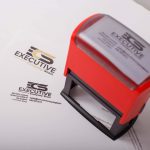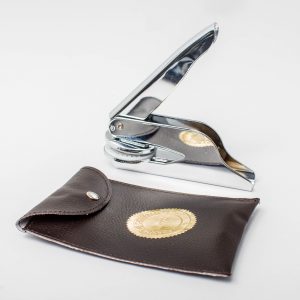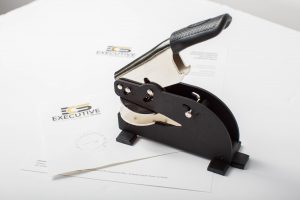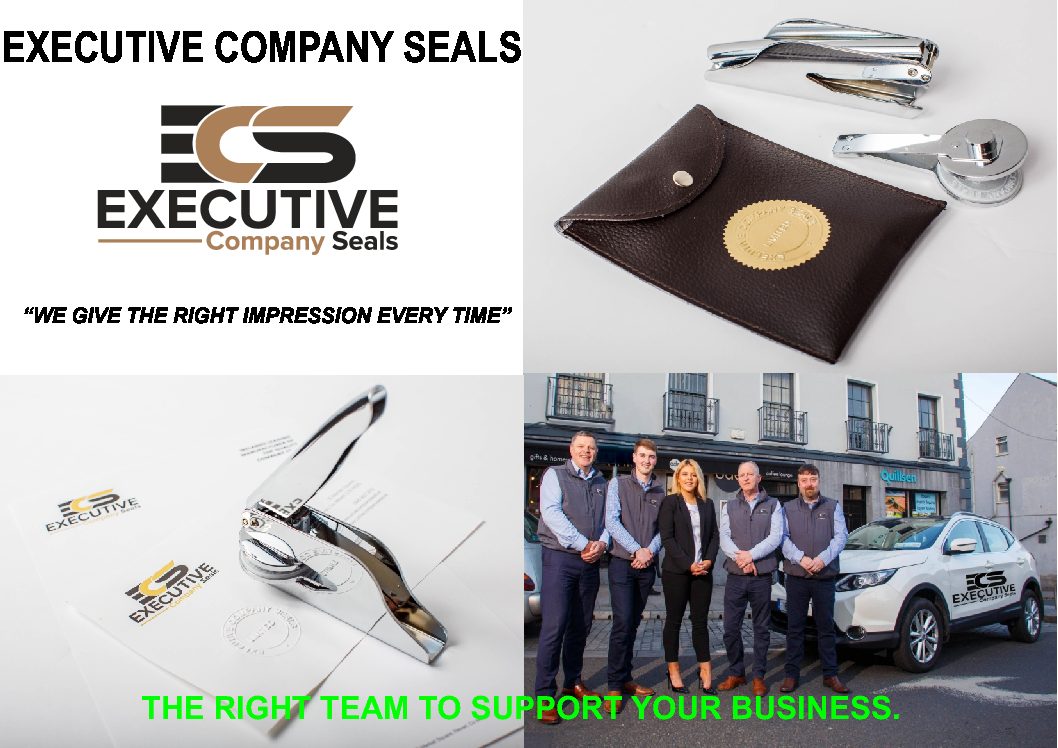December 2020
Voted Irelands No 1 Company Seal Manufacturer
Executive Company Seals Ltd are delighted to be voted Irelands Number 1 Company Seal Manufacturer 2020

FASTEST TOP QUALITY SEAL SERVICE
 Executive Company Seals is Ireland’s newest and fastest ‘Top Quality Seal Service’, with pliers seals available for collection from our Meath Retail Centre in just 1 hour if required!
Executive Company Seals is Ireland’s newest and fastest ‘Top Quality Seal Service’, with pliers seals available for collection from our Meath Retail Centre in just 1 hour if required!
Executive Company Seals Ltd was set up to provide a high-class company seal coupled with quality service and ‘NEXT DAY’ delivery! All seals and products are manufactured in our own facility in the heart of Co. Meath and come with a 10-year warranty. Our handheld Company Seals are 43mm in diameter which is the largest size for handheld seals in the market and will engrave up to 60 characters per seal on paper as fine as 80gsm up to 200gsm parchment paper and share certificates. The Executive Company Seal insert delivers a crisp sharp impression every time ideal for all your stamping needs. It comes in its own personalised leather pocket with a gold imprint to finish.
 We also supply Luxury Notary Seal Labels, Share Certificate Paper, All-in Combined Company Registers, Self Inking Rubber Stamps and Date Stamps.
We also supply Luxury Notary Seal Labels, Share Certificate Paper, All-in Combined Company Registers, Self Inking Rubber Stamps and Date Stamps.
September 2020
Company Seals & COVID-19
 How can we legally use the company seal without two company directors being available as witnesses?
How can we legally use the company seal without two company directors being available as witnesses?
The COVID-19 environment has had and may have into the future travel restrictions applied and will have important consequences for validly executing documents under the correct corporate authority that may be overlooked during this time. This note is intended to shed some light on the company law provisions surrounding the execution of documents under company seal and offers some practical solutions.
Section 43(2) of the Companies Act 2014 (the “Act”) states that, save as otherwise provided by the Act or by the constitution of the company, any instrument to which a company’s seal shall be affixed under witness by two directors, a director and a company secretary, or any individual with the authority to do so (in effect, that the affixing of the company seal is witnessed by two authorised persons). The most common instruments where a company seal is required to be affixed are instruments entered into as deeds, instruments of transfer, and share certificates.
Given the present restrictions of movement and physical distancing measures currently in place, it may be difficult to arrange for two individuals to witness the affixing of a company seal.
It is important to note the words “save as otherwise provided by the Act or by the constitution of the Company”, as this indicates that section 43(2) is an optional provision and can be amended by a company’s constitution. There is no statutory requirement that both signatories must witness the physical affixing of the seal, simply that the individuals are authorised to sign and/or affix the company seal by the directors or committee, where relevant.
In such circumstances where the authorised individuals are separated by distance, the wet-ink pages can be exchanged between the authorised individuals and sealed by the holder of the company seal. Taking this one step further, the discretionary nature of section 43(2) appears to permit a company’s constitution to be drafted to authorise the use of the company seal by an individual and signed without the need for countersignature, thereby allowing a single authorised individual witness the affixing of the seal.
It must be emphasised that this discretion covers the authority to affix the company seal, it does not permit company constitutions from doing away with the need for a company seal altogether as this is provided elsewhere in the Act. We have also received queries as to whether an individual who holds both offices of director and secretary can sign and countersign under the two different offices. This is specifically prohibited by section 134 of the Act. The default position therefore is that the seal must be witnessed by two different individuals, unless otherwise provided for.
Provided that the sealing requirements in a company’s constitutions are applied, and considering that no action of a private limited company may be invalidated for lack of capacity, it follows that an instrument so sealed will be invalidated only where it is in conflict with the law.
Many company constitutions will not reference section 43 and will simply apply the provisions of the Act in relation to affixing the company seal. This may not be the case post-COVID-19 era as more companies, and indeed legal practitioners, draft and adopt company constitutions that veer from the default section 43(2) provision.
In the event that your company’s constitution derogates from the default provisions of the Act (with regards to use of the company seal) and you wish to avail of same, it would be wise to flag this to any counterparties early in negotiations to avoid any unnecessary legal debate on completion.
In any case, the signing and witnessing of the affixing of the seal of the Company by an individual who is not a director of the Company will require a board minute, or in the case of a sole director company a resolution, authorising that the individual may affix the seal and sign an instrument as a witness. It is standard practice for a counterparty in any transaction to request a copy of documents directing corporate authority as evidence that the relevant instruments have been executed properly.
During the current restrictions on movement, company officers should consult the company constitution to determine how the company seal must be affixed as it may be unlikely that such circumstances have been legislated for and to reduce the risk of transactions being invalidated due to improper execution.
In light of the above, company directors may consider amending their company’s constitution to permit for simpler sealing requirements that are in line with the Act. Adopting a new company constitution requires a board meeting that is conducted under the current company constitution requirements and a special resolution of the shareholders approving adoption of the new constitution with the relevant filings to be made to the Companies Registration Office. Bear in mind that a 21 day period is imposed for the entry into force of a new constitution approved by a majority shareholder resolution and as such in order for it to be effective immediately it ought to be passed as a unanimous written resolution of all shareholders.
Other Options?
Companies can also decide to grant a power of attorney to one or more individuals which does not itself require to be entered into as a deed. This may be a simpler route and avoids the requirement to amend the company’s constitution, however there must be clarity on what the attorney is authorised to execute. Deeds signed under power of attorney are not required to be sealed but must be witnessed.
Another possible but uncommon alternative is section 16 of the E-Commerce Act 2000 which permits that, save as provided for in a company’s constitution, an instrument that must be signed as a deed may be signed by a certified e-signature provided that the other party accepts this approach. Again, this is not standard practice and may be prohibited under the company’s constitution but if it is not and the counterparty is prepared to accept it then it will be valid.
This expert advice was forwarded to us from Express Company Formations Ltd.
EXECUTIVE COMPANY SEALS FOR ALL YOUR STAMPING NEEDS!
February 2020
OUR HANDHELD COMPANY SEAL ‘ONLY €35.00’
Our handheld Company Seal pliers are made of durable steel with an electroplated Chrome finish. Our seal inserts or dies are made from eco-friendly Delrin polymer.
The Company Seal comes to you in its own leather pocket and its personalised gold imprint to finish.
All our Company Seals come with a 10-year warranty.
If you have any queries regarding the text you require on your Company Seal please do not hesitate to contact our team on +353 46 9073512.
All our Company Seals and products can be ready within one hour for same-day collection or guaranteed next day delivery.
About Company Seals
COMPANY SEAL PROTOCOL
All Irish companies must have a company seal, sometimes called a ‘common seal’. Under Irish company law there are particular rules around the use of a company seal and here is a simple guide.
What is a company seal?
A company seal consists of two opposing plates engraved in legible letters with the company name. When the two plates are pressed together on a sheet of paper the name of the company is clearly embossed on it.
The seal must state the exact registered name of the company but abbreviations are permitted for the different company types for example Ltd or CLG. A logo or other significant symbol particular to the company can also be incorporated into the design of its seal.
When to use the company seal?
Documents that must be executed under seal are called ‘deeds’ and documents that are executed under hand are ‘written contracts’. One of the main differences between these two types of documents is that there is no requirement for consideration for a deed to be binding but for a written contract to be binding there must be consideration.
Who can use a seal?
The company seal can only be used with the authority of the company directors, or a committee of its directors who have been duly authorised by its directors. So there must be a board resolution or a resolution of a board committee, reflected in the minutes of the relevant meeting or in a written resolution.
Unless the company’s constitution provides otherwise, any document to which the company seal is affixed must be signed by a director and countersigned by the company secretary or by a second director or some other person appointed by the directors or committee of directors.
Where should the company seal be kept?
There is no formal requirement to keep the seal in any particular place, our advice is to keep it in a safe place, clearly labelled to avoid loss, confusion or error.
Should a register of sealings be maintained?
There is no company law requirement to maintain a register of sealings and it is not common to do so. However practically speaking such a register may prove very useful particularly in instances where for example the seal is in regular use, a committee of directors have been appointed or if the company uses an official seal abroad.
Company Seal – Irish Companies
Do I Need a Seal?
Under Section 43(1) of the Companies Act 2014, every Irish registered company is required to have a company seal, sometimes referred to as a common seal. It is used to engrave or emboss the company’s name on legal documents. Under Irish company law, there are certain rules that govern the use of a seal.
What Documents Require a Seal?
The seal is used for, but not limited to, legitimising the following documents:
- Legal Contracts
- Share Certificates
- Board Meeting minutes
- Loan Documents
- Leases
Section 43 of the Act states that the seal can be used only by the authority of its director(s) or a registered person in relation to the company save as otherwise provided by the constitution. Additionally, any document certified by the seal must be signed by a company director and countersigned by the company secretary, a second director or an authorised person as appointed by the director(s).
When there is a corporate secretary the documents may be countersigned by a director of the secretarial company or an authorised person.
How Can I Order a Seal?
To order a seal contact us via our email at sales@executivecompanyseals.ie with your company name and number.
October 2019
THE HISTORY OF RUBBER STAMPS
Posted on 24/10/2019 by Executive Company Seals
Forgive us – we love all things rubber stamps related, as you might have guessed! So we wanted to share with you some interesting facts and tidbits of information about their history. And how they became to be so widely used in our everyday lives.
The history of rubber stamps actually dates back to 1844. The process of ‘stamping’ existed many years before this. Brass printing stamps were first used to mark paper, while brass stamps on the other hand were used with wax to ‘seal’ private papers with the crest of the owner the predecessor of Executive Companys Hand Held Embossing Seal.
The origin of the very first rubber stamp has been widely debated over the years. It is said however that Charles Goodyear was the first to discover the process of vulcanisation when he accidentally dropped some rubber and sulphur on the stove.
Vulcanised rubber was later used in early dentistry as part of a cost-effective denture bases.
From there the original rubber stamp is said to have been created in 1866 by James Woodruff after he took the techniques used by dentists and applied them to letter moulds. At a later date;mechanical date and letter stamps gained worldwide popularity and became common place in post offices and business workplaces.
The origin of picture stamps (or rubber picture stamps) is educational, being used in schools and educational institutions before becoming popular in the art world.
Now rubber stamps are an important part of the modern world – either making our lives fun or more productive or both!
Executive Company Seals also supply Luxury Notary Seal Labels, Share Certificate Paper, All-in Combined Company Registers and Handheld and desktop company seals.
**** BREXIT: ACT NOW TO PREPARE YOUR BUSINESS ****
30 days to go until 31st October 2019, the day the UK is scheduled to leave the EU.
The risk of a no-deal Brexit has never been higher.
Regardless of the nature of the UK’s exit from the EU, the way in which we trade with the UK will change.
The Minister for Business, Enterprise and Innovation, Heather Humphreys TD, is urging businesses to prepare now for these changes to protect themselves as far as possible against the challenges posed by Brexit.
The Department has developed a “Brexit Preparedness Checklist” to help businesses identify the steps they need to take now to prepare. The checklist includes a list of supports available to businesses, along with the contact details of the agencies that administer these supports.
Brexit Preparedness Checklist
More recently, the Government also launched “Getting your Business Brexit Ready Practical Steps” booklet. The booklet outlines the following 9 key steps that businesses should consider now to make sure they are best prepared for a no-deal Brexit: Getting your business Brexit ready – Practical Steps
– Review your supply chain and UK market strategy
– Understand the new rules for importing from or exporting to the UK
– Be aware of possible changes to transport and logistics for goods transiting via the UK
– Review all your regulation, licencing and certification requirements
– Review your contracts and your data management
– Manage your cash flow, currency and banking
– Protect and inform your staff
– Take advantage of Government Brexit programmes and supports
– Know more about the impact on your sector
For further information on how Brexit may affect your business, please visit the Government of Ireland Brexit website at www.gov.ie/brexit
September 2019
EXPRESS COMPANY SEALS
Why not avail of our Express Company Seal Service?
Executive Company Seals is Ireland’s fastest ‘Top Quality Seal Service’, with plier / desktop seals available for collection from our Meath Retail Centre in just 1 hour! Just call our team on 046-9073512 to place your order!!
Alternatively, you can order online at sales@executivecompanyseals.ie and your company seal will be delivered to you within 24 hours!
‘Ireland’s fastest Nationwide Supplier of Company Seals’
History of Company Seals
 A Brief History of Company Seals
A Brief History of Company Seals
Seals were historically made with wax embossed with an imprint. Their use dates back thousands of years. Today, company seals are made with a machine that has an upper and a lower die that creates an imprint when pressed together tightly.
Throughout history, seals have been used to give significance or legal standing to a varied array of documents. Early Biblical history records the use of a seal. In the Old Testament 1st Kings chapter 21 verse 8 we read:
“So she wrote letters in Ahab’s name, and sealed them with his seal, and sent the letters unto the elders and to the nobles that were in his city, dwelling with Naboth”.
This type of seal was originally a wax impression made by a stamped handle or often a ring. Every royal family had an official seal which carried great significance and security. Influential Merchants and legal professionals later adopted this type of seal for authentication purposes.
The type of seal used since the earliest of times for authentication purposes developed into the modern company seal or corporate seal as it is known in the United States. By the 19th century, seals had developed to include impressions embossed directly onto the paper or embossed onto a legal wafer (a red seal shape adhesive backed piece of paper often referred to as legal wafer, legal seal or company seal wafers). This type of company seal is used even today on share certificates, official company documents and other legal documents including deeds and official notarized documents. Although in some jurisdictions the legal requirement for a company seal has been relaxed, they continue to be used as a means of giving significance to a document. In company law they often replace the need for the signatures of the directors. All sealings are recorded in the Statutory Register (often referred to as a company register or a corporate register or kit) that the company or corporation keeps. The section that use of the company seal is recorded in is known as “The Register of Sealings”. These documents are kept at the registered address of the company and must be available for inspection by that jurisdiction which governs the company law for that company. If a sealing is not recorded in the Register of Sealings it would be of no legality. Thus seals still offer great security and authentication. For this reason company seals are still in common use and are particularly useful when managing a company. The outlined use of the company seal can be incorporated into the official Constitution of the Company.
Seals have been around for thousands of years and in today’s digital age they still seem set to endure.

